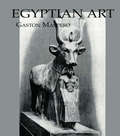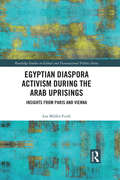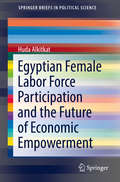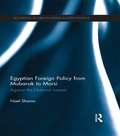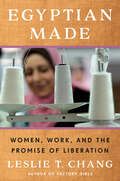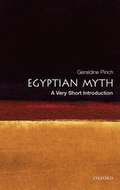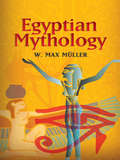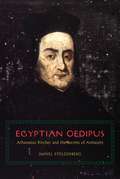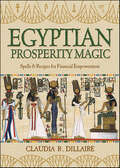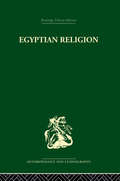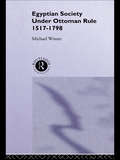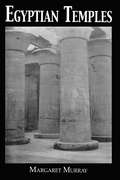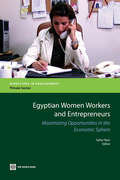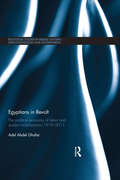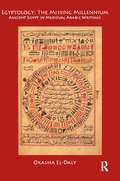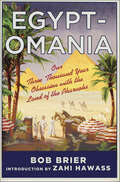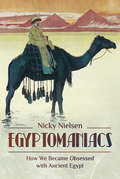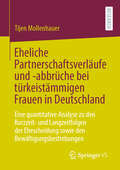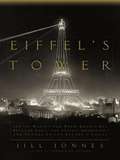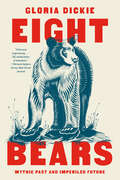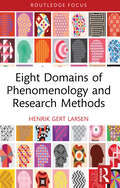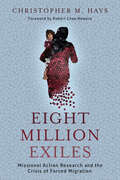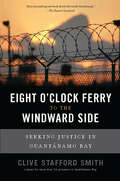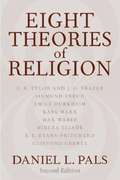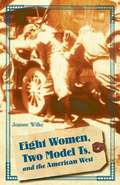- Table View
- List View
Egyptian Art: Studies
by MasperoFirst published in 2005. Gaston Maspero, the leading expert on Egyptian art, writes here with authority and style on a very significant aspect of ancient Egypt. By compiling and publishing this volume, he sought to familiarise the general public with some of the finest examples of ancient Egyptian art, and to enhance their appreciation of these treasures. Many of the pieces described herein were examined by the author in museums around the world. Others he caught as they emerged from the ground, moments after their discovery.
Egyptian Diaspora Activism During the Arab Uprisings: Insights from Paris and Vienna (Routledge Studies in Global and Transnational Politics)
by Lea Müller-FunkDiaspora politics is often expressed as an emancipating experience and can therefore give agency to migrants. Yet, rather than interpreting transnational political practices as globally liberal or cosmopolitan, Müller-Funk’s findings underline that diaspora politics is a highly diverse political field which can reinforce political fragmentation among migrant collectivities. This volume explores the controversial topic of diaspora politics: the political activities of migrants who aim to influence the domestic or foreign policy of their country of origin. The revolutions in 2010/11 represented a major political upheaval in the Middle East, which politicised Arabs across borders on a grand scale. Müller-Funk explores the links between recent political developments in Egypt between 2011 and 2013 and emigration. More specifically, she examines the question of how the revolution in and its aftermath influenced emigrants’ political perceptions and actions regarding their homeland. The book takes an interdisciplinary macro and micro approach by investigating policies which influence migrants’ political transnational behavior as well as by looking at individual activists’ perspectives. This volume will be of great interest to scholars of international relations, security studies, political theory, politics and middle east studies.
Egyptian Female Labor Force Participation and the Future of Economic Empowerment (SpringerBriefs in Political Science)
by Huda AlkitkatThis book sheds the light on the Egyptian females’ participation in labor force since 1960’s up to 2030. The main objective is to study trends of females’ participation in labor force and to predict the future participation. Egypt female participation in labor force has been increased slowly during the last fifty years since 1960’s, in spite of the encouragement polices that the government has adopted to empower women, particularly economic empowerment. Egypt's population size has rapidly increased during the past decades to about 90 million inhabitants in 2016. The working-age population (15-64) represents about 64% of the total population. Females represent about 49% of the working age population. However, they represent only about 24% of labor force in Egypt.Through its five chapters, this book will discuss the history of women's economic empowerment in Egypt, provide background on the trends of the most important female characteristics during the last decades, combines descriptive analysis with working life tables to break down the progression of the role of women in the Egyptian labor force, and presents a view of what could come in the time between now and 2030 in terms of the rights of women in this particular region.
Egyptian Foreign Policy From Mubarak to Morsi: Against the National Interest (Routledge Studies in Middle Eastern Politics)
by Nael ShamaEgyptian Foreign Policy from Mubarak to Morsi explores an area rarely touched upon by researchers, the relationship between regime security and the national interest. Concentrating on Egyptian foreign policy under President Hosni Mubarak, this book analyses how it was used to bolster his internal hold on power. In considering Egyptian foreign policy, two central case studies are examined. Firstly, Egypt’s reluctance to re-establish diplomatic ties with Iran, and secondly, Egypt’s response to the efforts of the Bush administration in promoting political reform in the Middle East. When examining these case studies the impact of different societal factors on decision-making is taken into consideration, highlighting the role of business groups and the security apparatus in foreign policy decision-making. Concluding with a discussion of Egypt's foreign policy in the first year of Mohamed Morsi's rule, and arguing that it has departed little from Mubarak's policy, this book is a vital resource for anyone interested in contemporary Egyptian politics, Middle East Studies and International Relations more broadly.
Egyptian Made: Women, Work, and the Promise of Liberation
by Leslie T. ChangAn incisive exploration of women and work, showing how globalization&’s promise of liberation instead set the stage for repression—from the acclaimed author of Factory Girls&“Exhaustively reported and researched, Egyptian Made takes us halfway across the world and inside the intimate lives of women caught between tradition and independence.&”—Monica Potts, New York Times bestselling author of The Forgotten GirlsWhat happens to the women who choose to work in a country struggling to reconcile a traditional culture with the demands of globalization? In this sharply drawn portrait of Egyptian society—deepened by two years of immersive reporting—Leslie T. Chang follows three women as they persevere in a country that throws up obstacles to their progress at every step, from dramatic swings in economic policy to conservative marriage expectations and a failing education system.Working in Egypt&’s centuries-old textile industry, Riham is a shrewd businesswoman who nevertheless struggles to attract workers to her garment factory and to compete in the global marketplace. Rania, who works on a factory assembly line, attempts to climb to a management rank but is held back by conflicts with co-workers and the humiliation of an unhappy marriage. Her colleague Doaa, meanwhile, pursues an education and independence but sacrifices access to her own children in order to get a divorce.Alongside these stories, Chang shares her own experiences living and working in Egypt for five years, seeing through her own eyes the risks and prejudices that working women continue to face. She also weaves in the history of Egypt&’s vaunted textile industry, its colonization and independence, a century of political upheaval, and the history of Islam in Egypt, all of which shaped the country as it is today and the choices available to Riham, Rania, and Doaa. Following each woman&’s story from home and work, Chang powerfully observes the near-impossible balancing act that Egyptian women strike every day.
Egyptian Myth: A Very Short Introduction
by Geraldine PinchThis introduction explains the cultural and historical background to the fascinating and complex world of Egyptian myth. To show the variety of source material for Egyptian myth, each chapter features a particular object--such as the obelisk known as Cleopatra's Needle, a golden statute of Tutankhamen, and a papyrus containing a story in which the Egyptian gods behave outrageously--which is illustrated by a photograph or line-drawing. In addition to a list of major deities and myths, there are explanations of related topics such as how hieroglyphs work, royal names and titles, and the Egyptian cosmos.
Egyptian Mythology
by F. Max MüllerThe complexities of Egyptian mythology — its gods, sun and animal worship, myths, and magical practices — are explored. The development of religious doctrines, as portrayed in art and in literature, also receives a close inspection. Magnificently illustrated, the text contains 232 figures that clarify ancient beliefs and customs.
Egyptian Oedipus: Athanasius Kircher and the Secrets of Antiquity
by Daniel StolzenbergA contemporary of Descartes and Newton, Athanasius Kircher, S. J. (1601/2-80), was one of Europe's most inventive and versatile scholars in the baroque era. He published more than thirty works in fields as diverse as astronomy, magnetism, cryptology, numerology, geology, and music. But Kircher is most famous--or infamous--for his quixotic attempt to decipher the Egyptian hieroglyphs and reconstruct the ancient traditions they encoded. In 1655, after more than two decades of toil, Kircher published his solution to the hieroglyphs, Oedipus Aegyptiacus, a work that has been called "one of the most learned monstrosities of all times. " Here Daniel Stolzenberg presents a new interpretation of Kircher's hieroglyphic studies, placing them in the context of seventeenth-century scholarship on paganism and Oriental languages. Situating Kircher in the social world of baroque Rome, with its scholars, artists, patrons, and censors, Stolzenberg shows how Kircher's study of ancient paganism depended on the circulation of texts, artifacts, and people between Christian and Islamic civilizations. Along with other participants in the rise of Oriental studies, Kircher aimed to revolutionize the study of the past by mastering Near Eastern languages and recovering ancient manuscripts hidden away in the legendary libraries of Cairo and Damascus. The spectacular flaws of his scholarship have fostered an image of Kircher as an eccentric anachronism, a throwback to the Renaissance hermetic tradition. Stolzenberg argues against this view, showing how Kircher embodied essential tensions of a pivotal phase in European intellectual history, when pre-Enlightenment scholars pioneered modern empirical methods of studying the past while still working within traditional frameworks, such as biblical history and beliefs about magic and esoteric wisdom.
Egyptian Prosperity Magic: Spells & Recipes for Financial Empowerment
by Claudia R. DillaireBoost your cash flow and free yourself from financial uncertainty with the Egyptian deities. From choosing a new career to surviving a layoff, this magic book offers more than two dozen simple spells and rituals to attract fortune and abundance.Work with Horus, Isis, Thoth, Amun, and other gods and goddesses from the Egyptian pantheon to help you catch a prospective employer's attention, design the perfect budget, control debt, and much more. You'll also create over twenty magical oils to bring greater success to your spellwork, job interviews, and résumés.Praise:"This book will delight the lovers of all things Egyptian and those who crave a historical basis to their spellwork."—Dana Eilers, author of The Practical Pagan
Egyptian Relgion (Anthropology and Ethnography)
by Siegfried MorenzIntroducing the reader to the gods and their worshippers and to the ways in which they were related, this book focuses on the ever-present link between the human and the divine in Ancient Egypt. The book also examines the impact of Egyptian religion upon the Judaeo-Christian world. First published in 1973.
Egyptian Society Under Ottoman Rule, 1517-1798
by Michael WinterMichael Winter's book presents a panoramic view of Ottoman Egypt from the overthrow of the Mamluk Sultanate in 1517 to Bonaparte's invasion of 1798 and the beginning of Egypt's modern period. Drawing on archive material, chronicle and travel accounts from Turkish, Arabic, Hebrew and European sources as well as up-to-date research, this comprehensive social history looks at the dynamics of the Egyptian-Ottoman relationship and the ethnic and cultural clashes which characterised the period. The conflicts between Ottoman pashas and their Egyptian subjects and between Bedouin Arabs and the more sedentary population are presented, as is the role of women in this period and the importance of the doctrinal clash of Islam both orthodox and popular, Christianity and Judaism. Winter's broad survey of a complex and dynamic society draws out the central theme of the emergence, from a period of ethnic and religious tension, of an Egyptian consciousness fundamental to Egypt's later development.
Egyptian Temples (Egypt Ser.)
by MurrayFirst published in 2005. Routledge is an imprint of Taylor & Francis, an informa company.
Egyptian Women Workers and Entrepreneurs
by Sahar NasrOver the past decade, Egyptian women have made significant progress in improving their economic and social status. The government's commitment to women's empowerment is strong at the highest political levels. Yet continued disparities remain in the country's labor market and in the business arena. 'Egyptian Women Workers and Entrepreneurs' analyzes these disparities and makes recommendations for needed change to ensure a level playing field. This groundbreaking book brings together data and extensive evidence on barriers to women's entry into business in Egypt and makes the case for actions to ensure gender equality. This book is based on a study that the Egyptian Ministry of Investment and Ministry of Manpower and Migration, and the National Council for Women requested to assist in analyzing the factors that influence women's low participation rate in economic activities, including the labor market and entrepreneurship. 'Egyptian Women Workers and Entrepreneurs' aims to fill the significant research gap on these subjects in Egypt as well as to provide suggestions to address continued gender inequalities. This book will be useful for donors, nongovernmental organizations, and researchers working to address gender barriers.
Egyptians in Revolt: The Political Economy of Labor and Student Mobilizations 1919–2011 (Routledge Studies in Middle Eastern Democratization and Government)
by Adel Abdel GhafarEgyptians in Revolt investigates the political economy of the Egyptian labor and student movements. Using elements of social movement theory within a broad political economy framework, it assesses labor and student mobilizations in four eras of contemporary Egyptian history: the pre-1952 era, the Nasser era, the Sadat era and the Mubarak era. Egyptians in Revolt examines how both student and labor groups responded to the political economy pressures of the respective eras. Within the context of social movement theory, the book argues that political opportunities and threats have had a significant impact on both student and labor mobilizations. In addition, the book explores how the movements have, at times, been able to affect government policies. However, the argument is made that the inability of both groups to sustain momentum in the long term is due to cooptation efforts by established political forces and the absence of viable and enduring organizational structures that are autonomous of state control. By combining analysis to include both labor and student movements, Egyptians in Revolt is a valuable resource for understanding the Egyptian political economy and its impact on mobilizations. It will therefore be of interest to students and scholars of Middle East Studies, as well as those interested in social movement more broadly.
Egyptology: Ancient Egypt in Medieval Arabic Writings (UCL Institute of Archaeology Publications)
by Okasha El DalyEgyptology: The Missing Millennium brings together for the first time the disciplines of Egyptology and Islamic Studies, seeking to overturn the conventional opinion of Western scholars that Moslims/Arabs had no interest in pre-Islamic cultures. This book examines a neglected period of a thousand years in the history of Egyptology, from the Moslem annexation of Egypt in the seventh century CE until the Ottoman conquest in the 16th century. Concentrating on Moslem writers, as it is usually Islam which incurs blame for cutting Egyptians off from their ancient heritage, the author shows not only the existence of a large body of Arabic sources on Ancient Egypt, but also their usefulness to Egyptology today. Using sources as diverse as the accounts of travelers and treasure hunters to books on alchemy, the author shows that the interest in ancient Egyptian scripts continued beyond classical writers, and describes attempts by medieval Arab scholars, mainly alchemists, to decipher the hieroglyph script. He further explores medieval Arab interest in Ancient Egypt, discussing the interpretations of the intact temples, as well as the Arab concept of Egyptian kingship and state administration—including a case study of Queen Cleopatra that shows how the Arabic romance of this queen differs significantly from Western views. This book will be of great interest to academics and students of archaeology, Islamic studies and Egyptology, as well as anyone with a general interest in Egyptian history.
Egyptomania: Our Three-Thousand Year Obsession with the Land of the Pharaohs
by Bob Brier“A delightful romp through key formative events that shaped our popular passion for all things ancient Egyptian.” —Peter Der Manuelian, Professor of Egyptology, Harvard UniversityWhen the Romans conquered Egypt, it was really Egypt that conquered the Romans. Cleopatra captivated both Caesar and Marc Antony and soon Roman ladies were worshipping Isis and wearing vials of Nile water around their necks. In this book, renowned Egyptologist Bob Brierexplores our three-thousand-year-old fascination with all things Egyptian—from ancient times to Napoleon’s Egypt Campaign, the discovery of Tutankhamen’s tomb, and beyond.In this original and groundbreaking book, Brier traces our fascination with mummies that seem to have cheated death and the iconic pyramids that have stood strong for millennia. He also includes twenty-four pages of color photos from his impressive collection of Egyptian memorabilia, which includes everything from Napoleon’s twenty volume Egypt encyclopedia to archeologist Howard Carter’s letters written as he was excavating the Valley of the Kings.
Egyptomaniacs: How We Became Obsessed with Ancient Epypt
by Nicky NielsenAn examination of the popular view of ancient Egypt as an exotic, esoteric, and mystical culture that questions if that view is entirely accurate.The Greek historian Hecataeus of Abdera declared during the 4th century BCE that the Egyptian civilization was unsurpassed in the arts and in good governance, surpassing even that of the Greeks. During the Renaissance, several ecclesiastical nobles, including the Borgia Pope Alexander VI claimed their descent from the Egyptian god Osiris. In the 1920s, the discovery of Tutankhamun’s tomb in the Valley of the Kings prompted one of the first true media frenzies in history. For thousands of years, the Pharaonic culture has been a source of almost endless fascination and obsession. But to what extent is the popular view of ancient Egypt at all accurate?In Egyptomaniacs: How We Became Obsessed With Ancient Egypt, Egyptologist Dr. Nicky Nielsen examines the popular view of Egypt as an exotic, esoteric, mystical culture obsessed with death and overflowing with mummies and pyramids. The book traces our obsession with ancient Egypt throughout history and methodically investigates, explains and strips away some of the most popular misconceptions about the Pharaohs and their civilization.Praise for Egyptomaniacs“I have always been attracted to and fascinated by Ancient Egypt. In this superb book, Nicky Nielsen explains why we are so caught up in what happened in Ancient Egypt.” —Books Monthly (UK)
Eheliche Partnerschaftsverläufe und -abbrüche bei türkeistämmigen Frauen in Deutschland: Eine quantitative Analyse zu den Kurzzeit- und Langzeitfolgen der Ehescheidung sowie den Bewältigungsbestrebungen
by Tijen MollenhauerMit ihrer retrospektiv angelegten quantitativen Studie zum Verlauf der Scheidungs- und Nachscheidungsphase türkeistämmiger Migrantinnen bedient Tijen Mollenhauer ein Desiderat sowohl der bisher kaum mit der geschlechterspezifischen Rolle geschiedener (türkeistämmiger) Migranten befassten Migrationsforschung als auch der kulturelle und ethnische Heterogenität weitgehend ausklammernden Scheidungsforschung. Fokussiert auf Unterschiede zwischen in Deutschland sozialisierten Frauen und Heiratsmigrantinnen zielt ihre Arbeit auf die scheidungsbedingten Kurzzeit- und Langzeitfolgen, die seitens der Frauen gewählten Bewältigungsbestrebungen sowie diesbezügliche Einflussfaktoren.
Eiffel's Tower
by Jill JonnesSince it opened in May 1889, the Eiffel Tower has become an iconic image of modern times: as much a beacon of technological progress as an enduring symbol of Paris and French culture. But as engineer Gustave Eiffel built the now-famous landmark to be the spectacular centrepiece of the 1889 World's Fair, he stirred up a storm of vitriol from Parisian tastemakers, law-suits and predictions of a certain structural calamity. A compelling account of the tower's creation as well as a superb portrait of Belle Epoque France.
Eight Bears: Mythic Past And Imperiled Future
by Gloria DickieA Best Book of the Year in The New Yorker, Economist, and Science News A Scientific American Best Staff Read Shortlisted for the Banff Centre Mountain Book Awards "Vivid and engrossing.… [A] celebration of beardom." —Richard Adams Carey, Wall Street Journal A global exploration of the eight remaining species of bears—and the dangers they face. Bears have always held a central place in our collective memory, from Indigenous folklore and Greek mythology to nineteenth-century fairytales and the modern toy shop. But as humans and bears come into ever-closer contact, our relationship nears a tipping point. Today, most of the eight remaining bear species are threatened with extinction. Some, such as the panda bear and the polar bear, are icons of the natural world; others, such as the spectacled bear and the sloth bear, are far less known. In Eight Bears, journalist Gloria Dickie embarks on a globe-trotting journey to explore each bear’s story, whisking readers from the cloud forests of the Andes to the ice floes of the Arctic; from the jungles of India to the backwoods of the Rocky Mountain West. She meets with key figures on the frontlines of modern conservation efforts—the head of a rescue center for sun and moon bears freed from bile farms, a biologist known as Papa Panda, who has led China’s panda-breeding efforts for almost four decades, a conservationist retraining a military radar system to detect and track polar bears near towns—to reveal the unparalleled challenges bears face as they contend with a rapidly changing climate and encroaching human populations. Weaving together ecology, history, mythology, and a captivating account of her travels and observations, Dickie offers a closer look at our volatile relationship with these magnificent mammals. Engrossing and deeply reported, Eight Bears delivers a clear warning for what we risk losing if we don’t learn to live alongside the animals that have shaped our cultures, geographies, and stories.
Eight Domains of Phenomenology and Research Methods
by Henrik Gert LarsenEight Domains of Phenomenology and Research Methods is a unique text that explains how the foundational literature representing our lifeworld experience aligns theory with research methods. Maintaining focus on the core problem of phenomenological investigations, the author strives to bridge theory with applied research by critically reviewing examples from the applied literature. With the extensive use of the foundational literature’s original voices, the book elaborates on how renowned scholars such as Husserl, Heidegger, and Sartre argued their ideas. A range of diverse voices ia also explored through the perspectives of feminist and Black phenomenologists. The text then goes on to unpack the phenomenological methodologies with detailed explanations of signature techniques, hereunder the epoché and reduction from the perspectives of transcendental phenomenology, phenomenological psychology, and genetic (generative) phenomenology. Finally, it addresses the problem of articulating phenomenological research questions as well as interview questions that align with the different domains and methodologies. This book is a must read for postgraduate students, dissertation students, and qualitative researchers interested in conducting phenomenological research within social psychology, sociology, and education.
Eight Million Exiles: Missional Action Research and the Crisis of Forced Migration
by Christopher M. HaysHow researchers used Missional Action Research to make a real difference for displaced persons in Colombia Christian scholars are often motivated to live the gospel by serving the vulnerable. But how do we put our academic research to practical use to help those in need? Christopher M. Hays explains how his interdisciplinary team of theologians, social scientists, pastors, and local partners combined efforts to support internally displaced persons of Colombia. Over eight million people have been driven from their homes by violence perpetrated by paramilitary and guerilla groups in the past two decades. The Colombian government is unequipped to deal with the sheer magnitude of the crisis. To serve displaced persons in a more robust and holistic way, the Faith and Displacement project developed Missional Action Research. This innovative method incorporated direct leadership and participation from local churches and displaced persons with stakes in the research process. The resulting curriculum covered: • Training in trauma-informed mental health care • Harnessing the unrecognized skills and resources of the community • Empowering displaced people economically through microenterprises and other ventures • Supporting participants with effective spiritual and pastoral care Weaving survivors&’ firsthand testimony with interdisciplinary theology, Eight Million Exiles will impress readers with the urgency of this conflict and inspire them with the model developed to address it. Let a small seminary in Medellín show you how to make a tangible difference in vulnerable communities.
Eight O'Clock Ferry to the Windward Side: Seeking Justice in Guantánamo Bay
by Clive Stafford SmithEvery time human rights lawyer Clive Stafford Smith lands in Cuba, he takes the eight o'clock ferry to the windward side; his journey ends at Guantánamo Bay. One of the few people in the world who has ongoing independent access to the prison, Smith reveals the grotesque injustices that are perpetrated there in the name of national security-including the justifications created to legitimate the use of torture and the bureaucratic structures that have been put in place to shield prison authorities from legal accountability. <P><P>By bearing witness to the stories of the forty prisoners that he represents, Smith asks us to consider what is done to American democracy when the rule of law is jettisoned in the name of combating terrorism.
Eight Theories of Religion (Second Edition)
by Daniel L. PalsEight Theories of Religion, Second Edition, begins with Edward Burnett Tylor and James Frazer--two Victorian pioneers in anthropology and the comparative study of religion. It then considers the great "reductionist" approaches of Sigmund Freud, Emile Durkheim, and Karl Marx, all of whom have exercised wide influence up to the present day. The discussion goes on to examine the leading challenges to reductionism as articulated by sociologist Max Weber (new to this edition) and Romanian-American comparativist Mircea Eliade. Finally, it explores the newer methods and ideas arising from the African field studies of ethnographer E. E. Evans-Pritchard and the interpretive anthropology of Clifford Geertz.
Eight Women, Two Model Ts, and the American West
by Joanne WilkeIn 1924 eight young women drove across the American West in two Model T Fords. In nine weeks they traveled more than nine thousand unpaved miles on an extended car-camping trip through six national parks, "without a man or a gun along." It was the era of the flapper, but this book tells the story of a group of farm girls who met while attending Iowa's Teacher's College and who shared a "yen to see some things." A blend of oral and written history, adventure, memoir, and just plain heartfelt living, Eight Women is a story of ordinary people doing extraordinary things. Weaving together a granddaughter's essays with family stories and anecdotes from the 1924 trip, the book portrays four generations of women extending from nineteenth-century Norway to present-day Iowa-- and sets them loose across the western United States where the perils and practicalities of automotive travel reaffirm family connections while also celebrating individual freedom.
